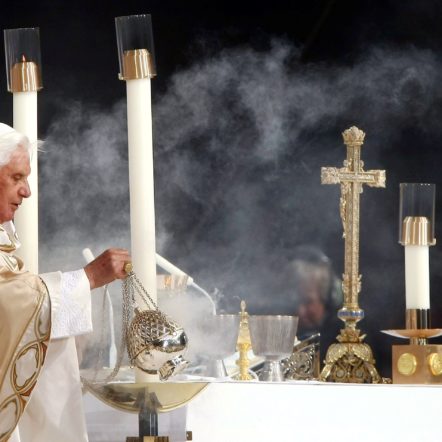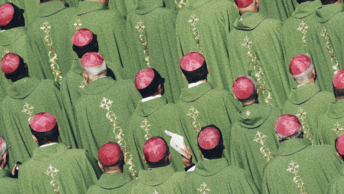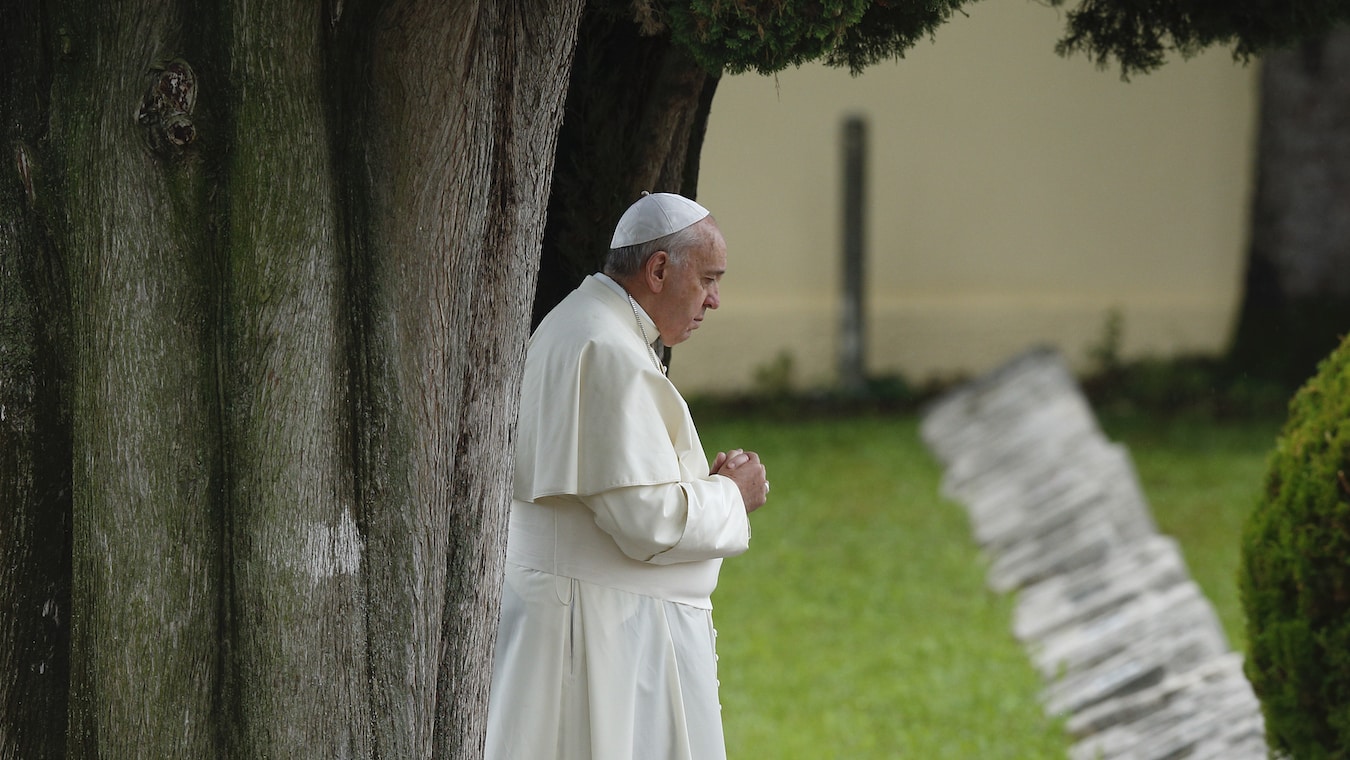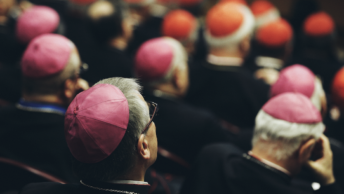As I noted in “Overcoming Our Social Chaos” and “A Layman’s Memo to Catholic Prelates” the future of both Catholic Church and Western Civilization will largely depend on the prelates’ willingness to meet their leadership responsibilities.
The editors of the Jesuit magazine America have expressed the related idea that prelates should “start listening to those who have left religion behind.” That idea is laudable, but it seems to imply that the prelates are already listening to Catholics who still practice their faith. That, alas, is not the case.
More often than not the prelates’ attitude is that lay people should, like good sheep, focus solely on obeying their shepherds and avoid analytical/critical thinking. Indeed, some prelates seem to believe there cannot possibly be a legitimate reason to criticize their pronouncements.
Such thoughts are seldom put into words, but if they were they would look something like this:
“We bishops and cardinals have been elevated to the positions the Apostles held. We have been anointed to lead our flocks toward salvation. According to the Church’s teaching, what we say about faith and morals is inspired by the Holy Spirit and even (under certain circumstances) INFALLIBLE. In contrast, individuals who comprise our flocks are called by God to trust us and follow our pronouncements. For anyone below our spiritual station to challenge those pronouncements would be an offense against God; accordingly, for us to take such challenges seriously would make us complicit in the offense.”
The perspective that Catholics who are over 50 years old received and generally accepted in their youth reflected what is shown above. I would guess that a small number of today’s practicing Catholics still embrace that perspective, but it seems clear that a much larger number have adopted a sharply modified one that could be expressed as follows:
“God has given the hierarchy an important role and we should therefore give their pronouncements careful consideration. However, the Holy Spirit also guides the laity through their God-given reasoning and conscience, and that guidance should ultimately take precedence.” (Note: if prelates are inclined to regard this perspective as a corruption of Catholic teaching, they should recall that the Church has traditionally considered conscience “the proximate norm of morality.”)
The central question that arises from these considerations is this: What do Catholics have a right to expect from the hierarchy? I believe three things:
1) Evidence that they have conducted thoughtful analysis of different points of view (theological, sociological, legal, etc.) about the issue before making any pronouncement.
2) Clear and honest explanation of whether the view they are advancing is (a) consistent, (b) partially consistent, or (c) inconsistent with traditional Church teaching.
3) Full and meaningful explanation of their pronouncement’s consistency or inconsistency with traditional Church teaching. In the case of consistency, that means specifying why they rejected any arguments offered for a change in teaching. In the case of inconsistency, specifying the reason(s) for the change in teaching—for example, that science, historical events, or linguistic findings proved the traditional view mistaken. Such specification will provide verification that the prelates are neither succumbing to socio/cultural pressure or fear of scandal, nor being guided merely by personal preferences.
When prelates fail to meet these expectations, they lose the trust of the laity (and often that of priests and nuns). Here are two dramatic examples of cases in which this failure and resulting loss of trust have occurred and are in fact still occurring!
Catholic Teaching on Contraception
First, some historical background: Though practiced earlier in history, contraception was first condemned as sinful by St. Augustine (354-430). Pope Sixtus V went even further, demanding that those who practiced it be charged with homicide. (His successor repealed that demand.) An 1886 manual directed priests to refuse absolution to those who committed the sin. In 1930 Pius XI strengthen the Church’s view of contraception by declaring that the primary purpose of marriage is the “procreation and education of children.” Pius XII approved a “natural” form of birth control, the Rhythm Method, but maintained the Church’s position on “artificial” contraception. Paul VI, in Humanae Vitae, forcefully confirmed the prohibition of artificial contraception, writing that “in urging men to the observance of the precepts of the natural law, which it interprets by its constant doctrine, [the Church] teaches that each and every marital act must of necessity retain its intrinsic relationship to the procreation of human life,“ adding that “sexual intercourse which is deliberately contraceptive” is “intrinsically wrong.” That has continued to be the official position of the Catholic Church.
U.S. Catholic prelates are surely aware of the above historical information. Even more importantly, since their ordination as priests, the great majority of them have had considerable experience hearing confessions and denying absolution to men and women who practiced contraception yet lacked a “firm purpose of amendment.” (That, after all, was their duty.) So they surely know the spiritual and psychological pain those men and women—many of them parents of large families—suffered by not being able to receive communion. Surely many of these prelates must regret not speaking out forcefully against Humanae Vitae when they were younger, even though their subordinate status at that time would no doubt have disqualified them from elevation to the hierarchy. But that does not explain why they have remained silent about it since their elevation!
Catholic Teaching on Homosexuality
Throughout the ages Catholic teaching has classified homosexual acts as “unnatural” and therefore sinful. This classification was drawn from both the Old and New Testaments, which explicitly condemned them. (See Genesis 19:5-7;, Leviticus 18:22, Romans 1: 26-28, Jude 1:7) The Church Fathers and saints who spoke out strongly against homosexual acts include Athenagoras of Athens, Tertullian, Eusebius, John Chrysostom, Augustine, Gregory the Great, Peter Damian, Thomas Aquinas, Catherine of Siena, Bernardine of Siena, and Peter Canisius.
The classification “unnatural” was based not only on moral judgment but also on human anatomical structure and function. There has never been a reason to question the latter judgment scientifically. The secular acceptance of homosexual acts was based on the widely promulgated work of Alfred Kinsey that has since been exposed as fallacious, and the pressure brought on the American Psychiatric Association (APA) by homosexual groups. As a result of that pressure, in 1973 the APA changed its classification of homosexuality as an abnormal “sociopathic personality disturbance” to a normal variation in sexual behavior.
In contrast with the APA reversal, the official Catholic view of homosexuality did not change and to this day remains as follows:
“Tradition has always declared that homosexual acts are intrinsically disordered. Under no circumstance can they be approved.” [Catechism 2357] Furthermore, “In Sacred Scripture [homosexual acts] are condemned as serious depravity and even presented as the sad consequence of rejecting God. This judgment of Scripture does not of course permit us to conclude that all those who suffer from this anomaly are personally responsible for it, but it does attest to the fact that homosexual acts are intrinsically disordered and can in no case be approved of. “[Vatican: Declaration on Sexual Ethics, par. 8]
However, despite the Church’s official position remaining the same as that of the Church Fathers and saints, many prelates allowed homosexual behavior in their seminaries and, in some cases, joined in it. Simply said, the prelates chose to follow mass culture rather than science and the Church. That same choice is evident in the feeble response of prelates from Rome to the U.S. to the normalizing of homosexuality by such a groups as “LGBTQIA” (an acronym which stands for Lesbian, Gay, Bisexual, Transgender, Queer, Intersex, Asexual). Consider, for example, the October 2014 draft of a Vatican synod report on family life that referred to “welcoming [homosexuals] . . . to a fraternal place in our communities,” and Pope Francis’ response to a reporter’s question about homosexuals, “Who am I to judge?”
Informed Catholics see not only inconsistency in the prelates’ behavior described in this essay, but also hypocrisy. They believe their Savior weeps over it. Accordingly, they believe that the prelates should do as they required millions of married couples who practiced contraception to do: “Confess their sins, do penance, and amend their lives.”
Copyright © 2022 by Vincent Ryan Ruggiero. All rights reserved








